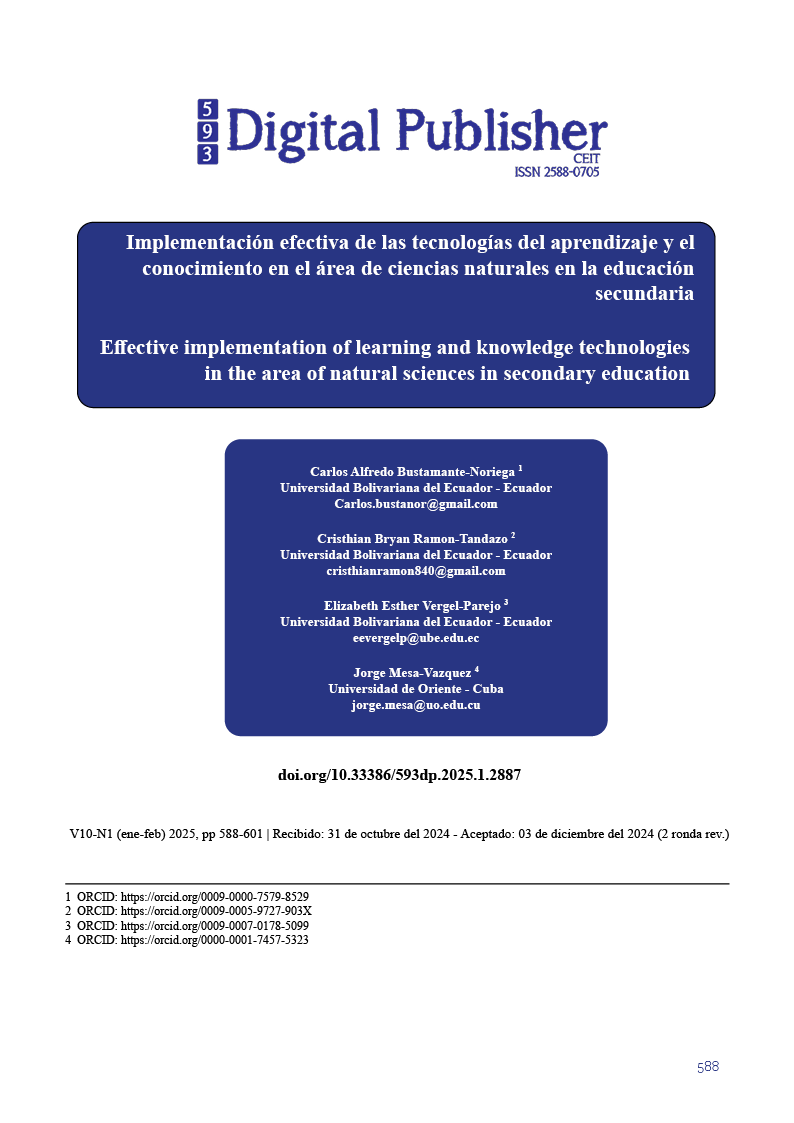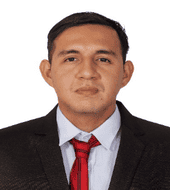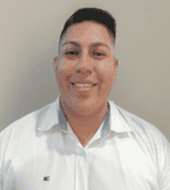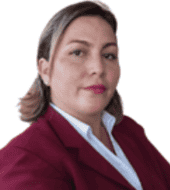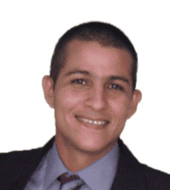Effective implementation of learning and knowledge technologies in the area of natural sciences in secondary education
Main Article Content
Abstract
This study analyzes the effective implementation of Learning and Knowledge Technologies (LKT) in the area of Natural Sciences in Secondary Education. The research addresses the problem that, despite the documented benefits, the integration of CAT in science teaching still faces challenges such as lack of teacher training and inadequate curriculum integration. The main objective of the research is to evaluate the impact of the effective integration of CT in the improvement of academic achievement in the area of Natural Sciences in the Ecuadorian context. For this purpose, an initial diagnosis of the students' level of knowledge was made, digital didactic tools that integrated different CTs, such as simulations, animations and virtual laboratories, were implemented, and finally, learning progress was evaluated. The results revealed that the effective implementation of CT in Natural Science teaching significantly improved students' performance and motivation, as well as their understanding and retention of key concepts. These findings provide empirical evidence supporting the adoption of CTs in science education, overcoming existing challenges through appropriate curriculum integration and teacher training. In conclusion, this study highlights the potential of CT to transform and enrich the teaching and learning processes in the area of Natural Sciences in Secondary Education.
Downloads
Article Details

This work is licensed under a Creative Commons Attribution-NonCommercial-ShareAlike 4.0 International License.
1. Derechos de autor
Las obras que se publican en 593 Digital Publisher CEIT están sujetas a los siguientes términos:
1.1. 593 Digital Publisher CEIT, conserva los derechos patrimoniales (copyright) de las obras publicadas, favorece y permite la reutilización de las mismas bajo la licencia Licencia Creative Commons 4.0 de Reconocimiento-NoComercial-CompartirIgual 4.0, por lo cual se pueden copiar, usar, difundir, transmitir y exponer públicamente, siempre que:
1.1.a. Se cite la autoría y fuente original de su publicación (revista, editorial, URL).
1.1.b. No se usen para fines comerciales u onerosos.
1.1.c. Se mencione la existencia y especificaciones de esta licencia de uso.
References
Badia, A., García, C., & Meneses, J. (2019). Approaches to teaching using digital technologies: An exploratory factor analysis. Computers & Education, 139, 178-189. https://doi.org/10.1016/j.compedu.2019.05.006
Badia, A., Meneses, J., & García-Peñalvo, F. J. (2019). Las competencias en información y la competencia digital en educación secundaria obligatoria: evaluación de creencias, conocimientos y experiencias de los estudiantes. Cultura y Educación, 31(2), 362-402. https://doi.org/10.1080/11356405.2019.1630678
Barak, M. (2017). Science teacher education in the twenty-first century: a pedagogical framework for technology-integrated social constructivism. Research in Science Education, 47(2), 283-303. https://doi.org/10.1007/s11165-015-9501-y
Bonfante Rodríguez, M., Marriaga González, C., Mesa Vazquez, J., Salgado Bustillo, P., & González Diaz, J. (2024). Gestión de la salud y la seguridad en el trabajo y las aplicaciones del Internet de las cosas. Revista Cubana de Información En Ciencias de La Salud, 35. https://acimed.sld.cu/index.php/acimed/article/view/2606
Bueno Gualan, P. A., Yanangomez Duchi, J. A., Neira Gavilanes, D. A., López Rodríguez, D. J., & Mesa Vazquez, J. (2023). Competencias para docentes de educación básica en la creación de contenidos educativos digitales en Ecuador. Revista Universidad y Sociedad, 15(5), 336–348. https://rus.ucf.edu.cu/index.php/rus/article/view/4082
Cabero-Almenara, J., & Llorente-Cejudo, M. C. (2015). Tecnologías de la Información y la Comunicación (TIC): escenarios formativos y teorías del aprendizaje. Revista Científica de Educomunicación, 45(23), 19-30. https://doi.org/10.3916/C45-2015-02
Coll, C. (2013). El currículo escolar en el marco de la nueva ecología del aprendizaje. Aula de Innovación Educativa, 219, 31-36.
Del Rocio Tixi Cujilema, N., Paola Veloz Montenegro, C., Judith López Rodríguez, D., & Mesa Vazquez, J. (2023). Percepción de estudiantes sobre el uso de tecnologías digitales en las ciencias naturales en Ecuador. Universidad y Sociedad, 15(6).
Espinosa Izquierdo, J., Villamar Bravo, J., Quijije Acosta, K., & Mesa Vazquez, J. (2023a). Applicability of emerging technologies in virtual learning environments. a look at the university of Guayaquil. International Technology Science and Society Review, 15(1). https://doi.org/https://doi.org/10.37467/revtechno.v15.5098
Espinosa Izquierdo, J., Villamar Bravo, J., Quijije Acosta, K., & Mesa Vazquez, J. (2023b). Las nuevas tecnologías de la información y la comunicación en el ámbito educativo. Revista Polo Del Conocimiento, 8(3), 17. https://doi.org/10.23857/pc.v8i3
Gimbe, A., Morasen Cuevas, J. R., Pardo Gómez, M. E., & Mesa Vazquez, J. (2024). Diagnóstico de competencias digitales docentes en el entorno universitario estudio de caso en la Universidad Lusíada de Luanda. Maestro y Sociedad, 21(1), 109–125. https://maestroysociedad.uo.edu.cu/index.php/MyS/article/view/6347
Gros, B., & García-Peñalvo, F. J. (2016). Future trends in the design strategies and technological affordances of e-learning. Learning, Design, and Technology, 1-23. https://doi.org/10.1007/978-3-319-17727-4_3-1
Hernández-Sampieri, R., & Mendoza, C. (2018). Metodología de la investigación. McGraw-Hill Education.
Kaufman, J. C., & Sexton, J. D. (2006). Why doesn't the writing cure help writers? Review of General Psychology, 10(3), 267-270. https://doi.org/10.1037/1089-2680.10.3.267
Koehler, M. J., & Mishra, P. (2009). What is technological pedagogical content knowledge? Contemporary Issues in Technology and Teacher Education, 9(1), 60-70.
Merchant, Z., Goetz, E. T., Cifuentes, L., Keeney-Kennicutt, W., & Davis, T. J. (2014). Effectiveness of virtual reality-based instruction on students' learning outcomes in K-12 and higher education: A meta-analysis. Computers & Education, 70, 29-40. https://doi.org/10.1016/j.compedu.2013.07.033
Mesa Vazquez, J. (2015). La elaboración de medios didácticos sustentados en las tecnologías de la información y las comunicaciones en la formación inicial del profesional de la educación [Universidad de Oriente]. http://repositorio.eduniv.cu/items/show/1375
Mesa Vazquez, J., Claudia Bonfante, M., Antonia Diaz Mendoza, M., Terán Palacio, E., & Ramón Velázquez Labrada, Y. (2023). Criterios de calidad para la evaluación de ambientes virtuales de aprendizaje desde un enfoque docente. Universidad y Sociedad, 15(4). https://rus.ucf.edu.cu/index.php/rus/article/view/4011
Mesa Vázquez, J., Pardo Gómez, M. E., & Cedeño Marcillo, G. E. (2022). Informatics and informational competencies in scientific information management in postgraduate education. Estudios Pedagogicos, 48(2), 103–114. https://doi.org/10.4067/S0718-07052022000200103
Osborne, J., & Dillon, J. (2008). Science education in Europe: Critical reflections (Vol. 13). London: The Nuffield Foundation. https://www.nuffieldfoundation.org/sites/default/files/Sci_Ed_in_Europe_Report_Final.pdf
Palacios-Díaz, D., Santamaría-Lancho, M., Hernández-Encinas, A., & García-Peñalvo, F. J. (2019). Unifying digital tools in the framework of a flipped classroom approach for a Physics course at the university level. IEEE Access, 7, 17968-17978. https://doi.org/10.1109/ACCESS.2019.2896967
Palacios-Díaz, Y., Gómez-Zermeño, M. G., & Alemán de la Garza, L. Y. (2019). Uso de herramientas tecnológicas y aprendizaje significativo de las Ciencias Naturales. Revista de Educación a Distancia, 19(59), 1-21. https://doi.org/10.6018/red/59/05
Pennebaker, J. W., & Chung, C. K. (2011). Expressive writing: Connections to physical and mental health. In H. S. Friedman (Ed.), The Oxford handbook of health psychology (pp. 417-437). Oxford University Press. https://doi.org/10.1093/oxfordhb/9780195342819.013.0018
Rocard, M., Csermely, P., Jorde, D., Lenzen, D., Walberg-Henriksson, H., & Hemmo, V. (2007). Science education now: A renewed pedagogy for the future of Europe. Brussels: Directorate General for Research, Science, Economy and Society. https://ec.europa.eu/research/science-society/document_library/pdf_06/report-rocard-on-science-education_en.pdf
Ruiz-Palmero, J., Sánchez-Rodríguez, J., & Gómez-García, M. (2013). Entornos personales de aprendizaje: estado de la situación en la Facultad de Ciencias de la Educación de la Universidad de Málaga. Píxel-Bit. Revista de Medios y Educación, 42, 171-181.
Tondeur, J., Van Braak, J., Ertmer, P. A., & Ottenbreit-Leftwich, A. (2017). Understanding the relationship between teachers' pedagogical beliefs and technology use in education: a systematic review of qualitative evidence. Educational Technology Research and Development, 65(3), 555-575. https://doi.org/10.1007/s11423-016-9482-z
Vargas Gaona, M. del C., Taipicaña Proaño, M. L., Cedeño Marcillo, G. E., & Mesa Vázquez, J. (2023). Propuesta de instrumento para evaluar el nivel de competencias docentes en el uso de herramientas digitales como medio didáctico. Revista Órbita Pedagógica, 10, 123–136. https://revistas.utm.edu.ec/index.php/ROP/article/view/6104
Vásquez, J. M., & Marcillo, G. E. C. (2020). Escala De Medición Del Nivel De Profesionalización Pedagógica En La Elaboración De Medios Didácticos Sustentados En Las Tics. Mikarimin. Revista Científica Multidisciplinaria. e-ISSN 2528-7842, 6(3), 117–132. https://bit.ly/3saFzSl

